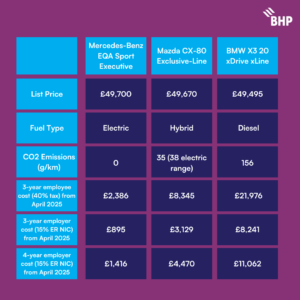The new tax year is fast approaching, and subject to the government’s National Insurance Contributions bill receiving the final royal assent, we will have a new rate of employers National Insurance Contributions (“NIC”) of 15% taking effect for payroll periods commencing April 2025. Here is one potential action employers could undertake to mitigate the effects of this increase.
Review your company car fleet!
If your fleet consists of petrol, diesel, or hybrid vehicles, unfortunately, your bill to HMRC will increase in April due to the increase in the benefit-in-kind tax on the company vehicle (plus the NIC % increase).
A move towards electric vehicles could significantly decrease the cost of your fleet. In terms of P11d benefit-in-kind (BIK) charges, electric vehicles attract much lower charges and are still attractive despite increases in BIK rates and the NIC rate change.
To demonstrate this point further, below are three similar-priced vehicles and the associated BIK tax cost over a three or 4-year lease:

Further savings can also be achieved due to:
- It is possible to provide the vehicle via a salary sacrifice arrangement
- There is no fuel benefit charge on P11d, even if you provide electricity to charge the vehicle
- The vehicle qualifies for 100% first-year allowances on the purchase for capital allowances purposes and 100% allowances for the installation of electric charging points.
- If the vehicle is leased instead of purchased, it should qualify for corporate tax reliefs, and typically, 50% of input VAT can be recovered on the lease.
What could I do now?
- Review your lease expiry dates to identify when it is possible to switch to electric vehicles.
- Review your wider travel costs and linked expenditures. There are many options here, and potential tax exemptions could apply depending on the pattern of the facts, or controls could be restructured to reduce administrative costs.
- If you have electric vehicles, make sure its via a salary sacrifice arrangement, if not could it be restructured to be offered this way?
- Do your homework. There are lots of providers who can provide these arrangements, but different levels of service or insurance coverage, etc, are offered. Speak to your local tax advisor before committing.
For other potential actions employers could undertake to mitigate the National Insurance increases, read this blog.
For more information, please contact Kyle Newton, Tax Partner.
This material is for informational purposes only and should not be relied upon as professional advice.



